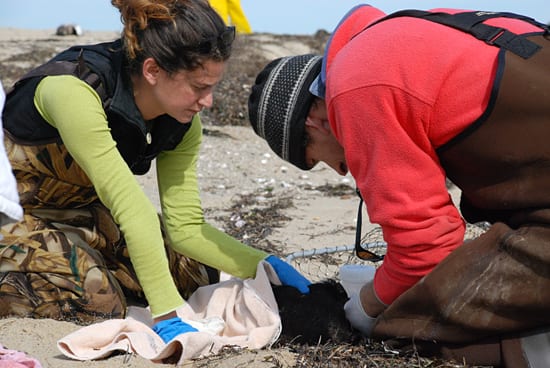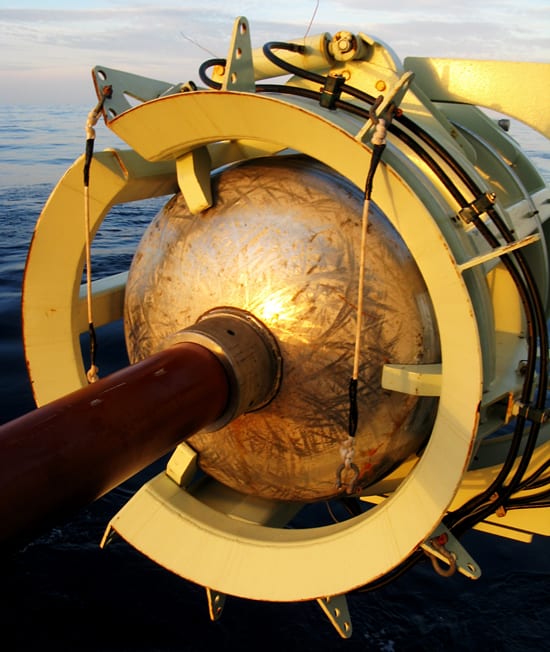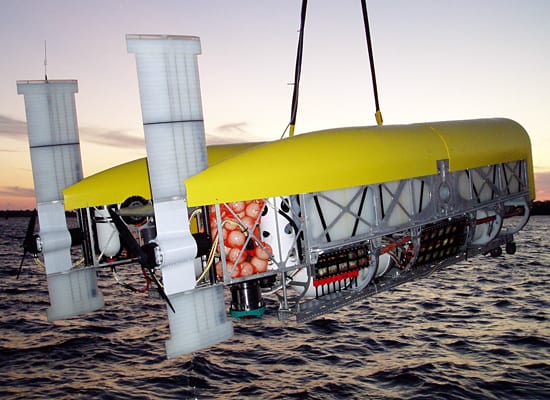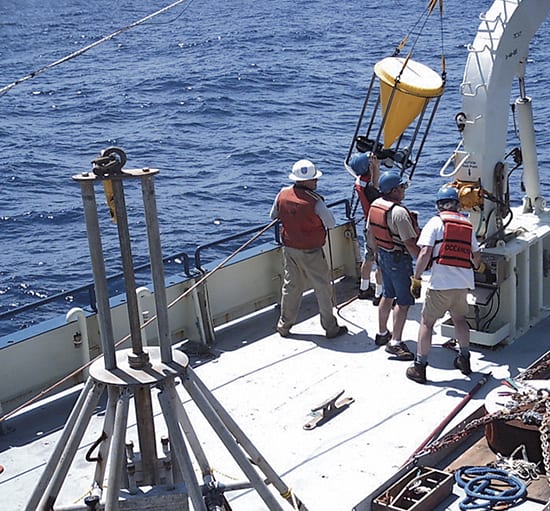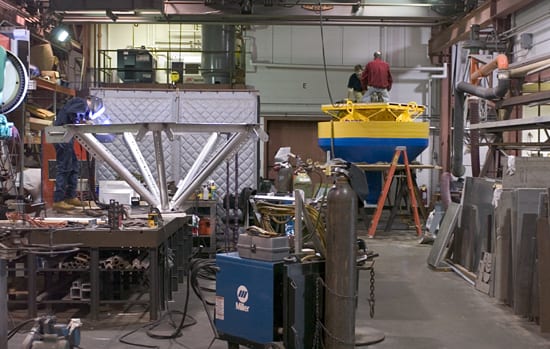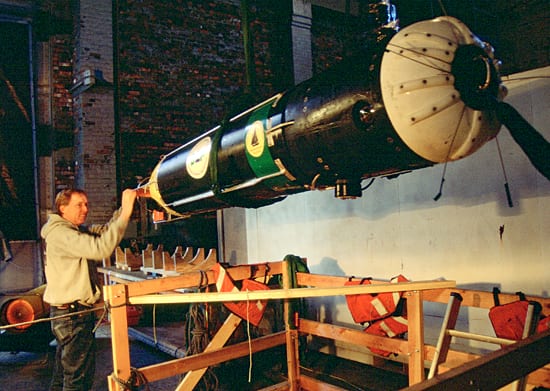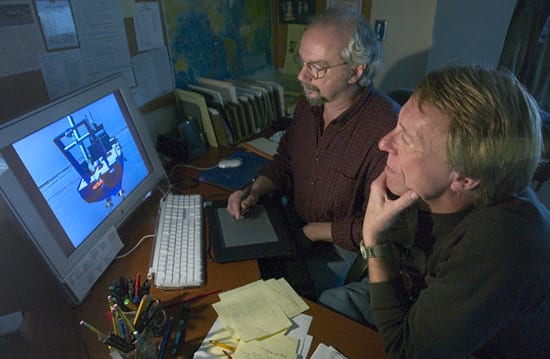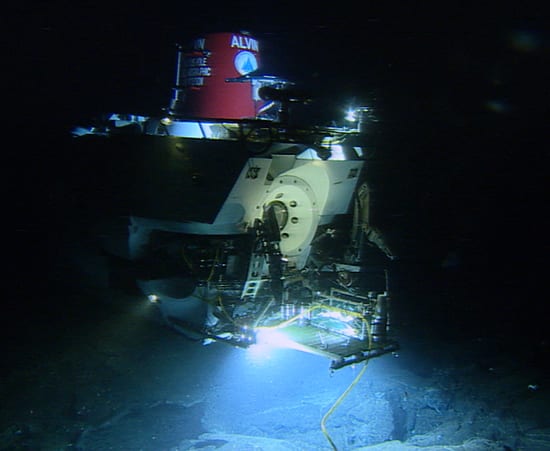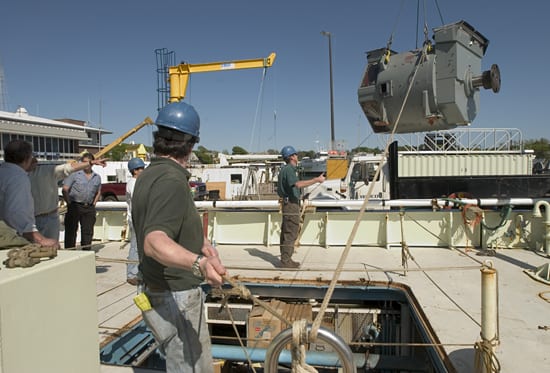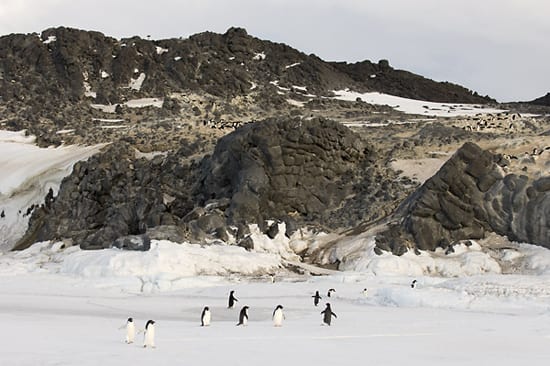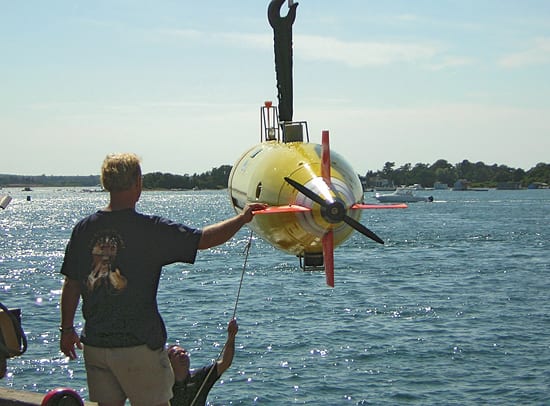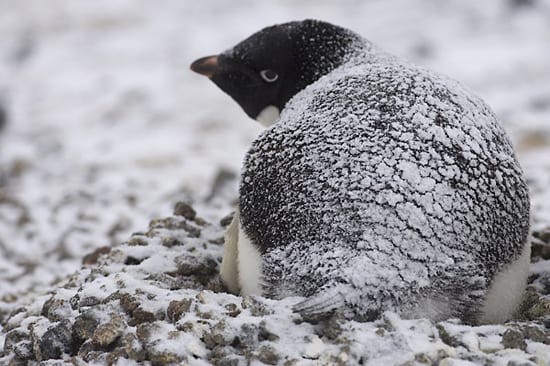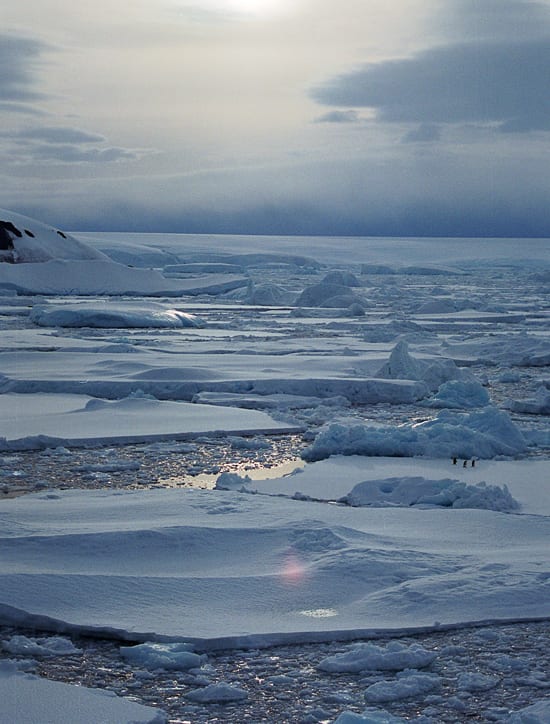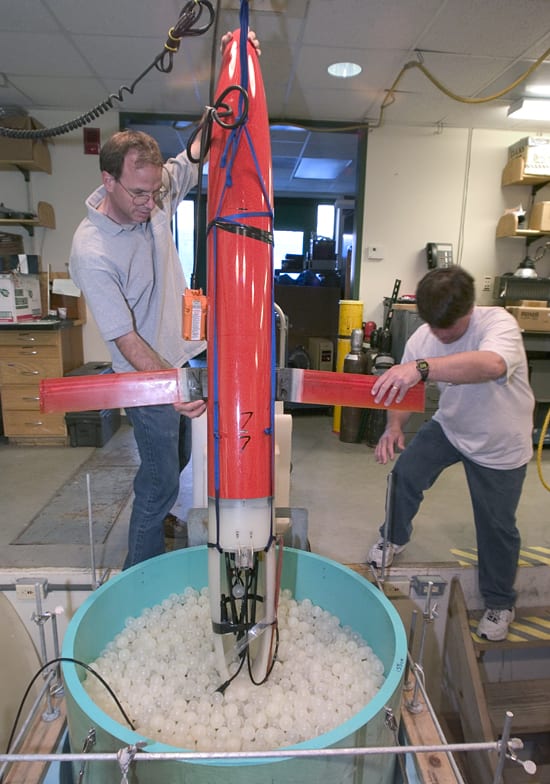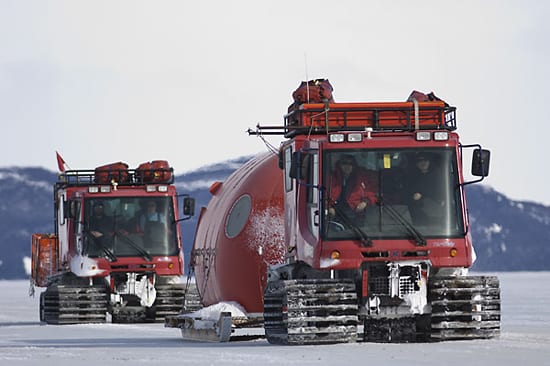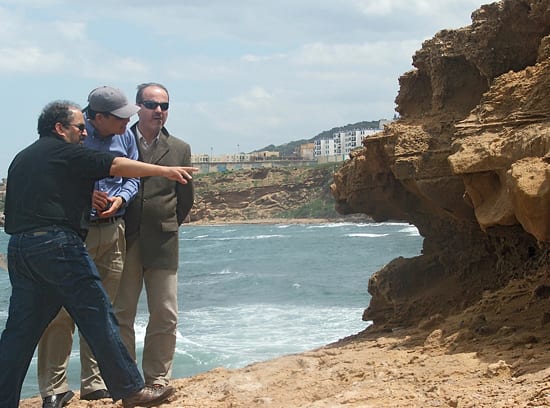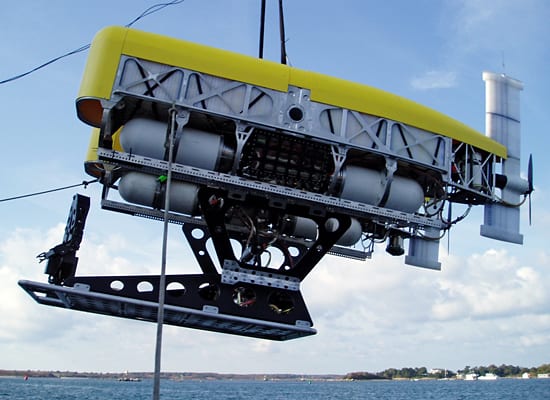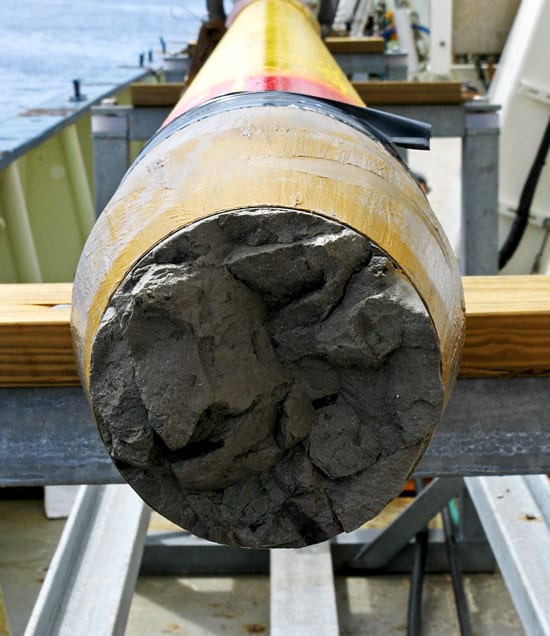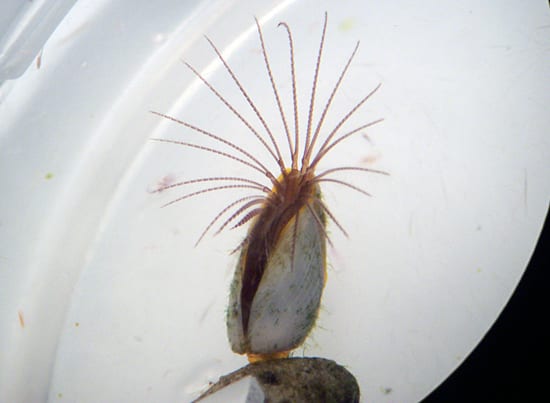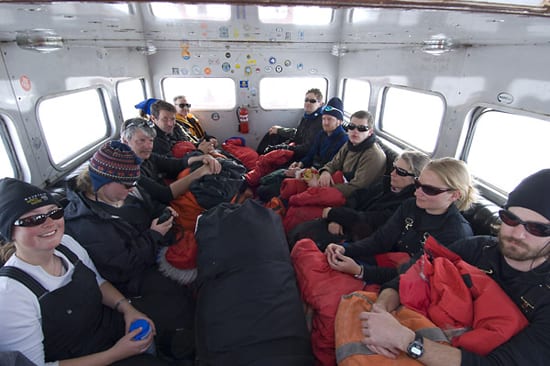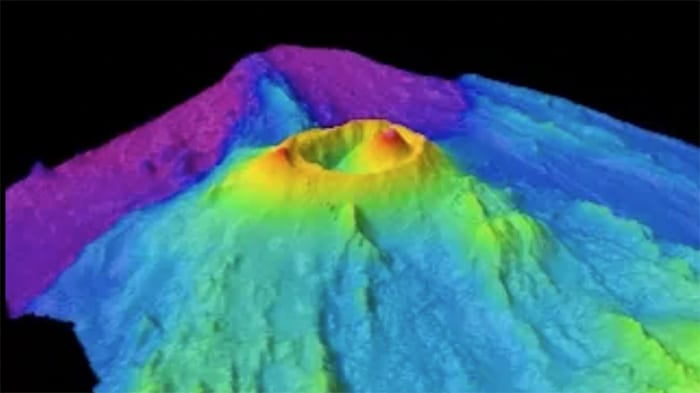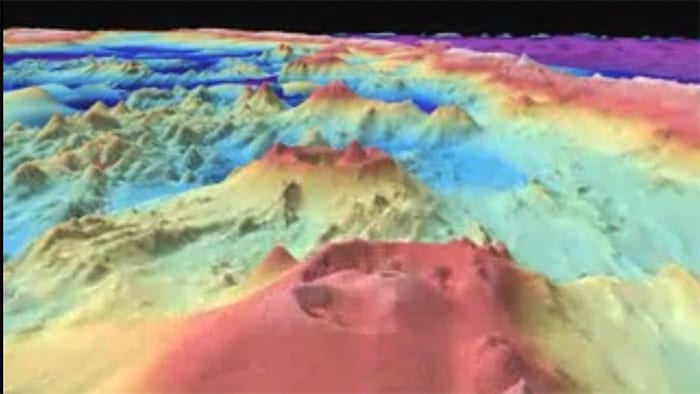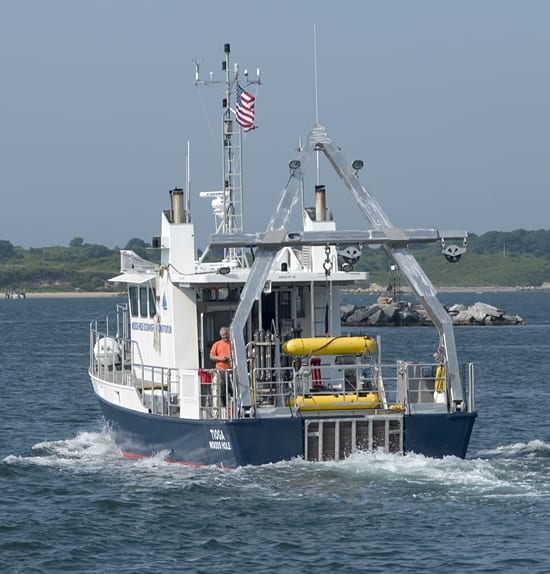Multimedia Items
Troubled Species
WHOI research associate Andrea Bogomolni and research specialist Michael Moore take a blood sample from a dying eider duck on a beach in Wellfleet, Mass., in the summer of 2007.…
Read MoreBig Head
Sunrise illuminates the bottom of the corehead of WHOI’s new long coring system on the research vessel Knorr. The head is held fast (in its stowed position) by the jaws…
Read MoreDawn of a New Year and Era
The new hybrid remotely operated vehicle (HROV) Nereus is lowered toward Atlantic waters for one of its many engineering tests in 2007. In November, the one-of-a-kind vehicle made its first…
Read MoreSetting a Trap
Scientific and ship crew members on the research vessel Oceanus work to deploy a sediment trap off the New England coast. Marine chemist Tim Eglinton and colleagues are investigating how…
Read MoreA Well-Oiled Machine (Shop)
Michael McCarthy (black shirt) of WHOI Operational Scientific Services and Neil McPhee (red shirt) of the Instrument Systems Development Lab stand atop a new tsunami and earthquake monitoring buoy being…
Read MoreExploring an Underground Sea
Senior engineer Tom Austin of the Oceanographic Systems Laboratory (OSL) steadies a custom-built REMUS autonomous underwater vehicle as it is raised off its storage platform. In 2003, the specially designed…
Read MoreArt Meets Science
WHOI animation specialist Jack Cook (center) works with senior research specialist Jim Broda (right) on an animation of the new WHOI long-coring system for the research vessel Knorr. WHOI Graphic…
Read MoreVenerable Ocean Explorer
In 41 years of operation, the submersible Alvin has logged more than 4,300 dives and 30,000 hours exploring the deep ocean, diving a combined total of more than 9 million…
Read MorePower Play
Captain Kent Sheasley (center, background) directs the crane and chief engineer Pat Mone tends the line (foreground) as a propulsion motor is removed from the research vessel Knorr for maintenance.…
Read MoreCool Yule
Ocean-going research doesn’t wait for holidays, so the science and ship crews take the holidays with them. On Christmas morning 2006, during an expedition to the East Pacific Rise, the…
Read MoreBlack Tie Required
Cape Royds in Antarctica is a spectacular place, with brilliant blue-white ice stretching out to sea and black sand beaches warming in the sun. Penguins are everywhere, seemingly always on…
Read MoreSteady
At the WHOI dock, Aaron Kayes of the Naval Oceanographic Office (NAVOCEANO) holds the rope line and Frank Raspante of Hydroid, Inc., holds a tail fin as the REMUS-6000 vehicle…
Read MoreThe Weather Outside is Frightful
An Adélie penguin hunches down over its nest as icy winds whip across Cape Royds. Nearly 80 percent of Adélie chicks do not survive their first year, according to researcher…
Read MoreSummertime, and the Livin’ is Easy
It’s Solstice day, but what that means depends on which end of the earth you live on. In the northern hemisphere, mid-winter’s day is the shortest (and the night is…
Read MoreMaking a Splash with Spray
WHOI senior engineering assistant Brian Guest and engineer Jeff Sherman of the Scripps Institution of Oceanography work with a Spray glider in a Quissett Campus lab in April 2004. Guest…
Read MoreFresh Tomatoes
While working in Antarctica, some research groups travel with a complete portable shelter called a “tomato.” The fiberglass-walled unit keeps people out of the elements and provides a place to…
Read MoreLooking for the Quake in the Earth
WHOI geophysicist Jian Lin (in blue shirt) and colleagues examine geological evidence of past earthquakes near the Mediterranean coast of Algeria. Lin’s work in that nation has been funded by…
Read MoreGetting Ready to Leave the Nest
The hybrid remotely operated vehicle (HROV) Nereus was tested several times from the Woods Hole dock in 2007, and recently underwent open-water trials off Hawaii in November. Now in the…
Read MoreA Straw Full of Mud Shake
Muddy sediment from beneath the seafloor pokes out of one of the first long cores collected by the new sampling system on the research vessel Knorr. Scientists use sediment cores…
Read MoreHairy Stowaway
While towing a phytoplankton net near the Vanuatu Islands for samples of the colonizing bacteria Trichodesium, researchers caught a straggler a barnacle attached to a floating piece of pumice. Though…
Read MoreTaking the Bus Home from School
Exhuasted from two days of survival camp, researchers and explorers ride slowly back to Antarctica’s McMurdo Station in an oversized transport vehicle. Each person was required to learn to build…
Read MoreFly Through Brothers Volcano
Brothers submarine volcano is host to the most active and possibly largest of any hydrothermal vent fields discovered to date along the Kermadec Arc. The three-dimensional image depicts Brothers, looking…
Read MoreFly Through the Kermadec Arc
The NZASRoF?07 Kermadec Arc expedition departed from Auckland Harbor, heading up the Ngatoro Rift Basins and on to Brothers Volcano. The bathymetry fly-through begins over the North Island of New…
Read MoreTaking Junior for a Swim
The coastal research vessel Tioga leaves Woods Hole’s Great Harbor with the autonomous underwater vehicle SeaBED strapped to its stern. Tioga is frequently used as a platform for taking new…
Read More
